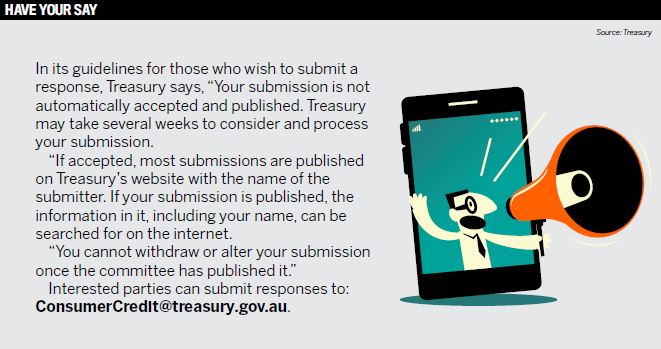

The draft Mortgage Brokers Bill gives the third party channel an unprecedented opportunity to shape the future of lending, but will the regulators listen? Australian Broker examines the proposals and what they could mean for brokers and borrowers
On 18 August, the government announced it would fast-track its response to the royal commission’s recommendations with a wave of new legislation that Treasurer Josh Frydenberg promised would be finalised before the end of this year.
Then, on 26 August the draft National Consumer Credit Protection Amendment (Mortgage Brokers) Bill 2019 and draft regulations were released for public consultation.
The contents are extensive (see box) and tackle top-line industry issues resulting from the royal commission, including the mortgage broker’s best interests duty and new rules around clawbacks.
The Bill would also enshrine three changes to mortgage broker remuneration: requiring the value of upfront commissions to be linked to the amount drawn down instead of the loan amount; banning campaign and volume-based commissions and payments; and capping soft-dollar benefits.
In total, 16 obligations are listed in the Bill, and many elements echo the recommendations of the Combined Industry Forum.
Contravention of any single obligation carries a maximum fine of 5,000 penalty units. The rules apply to both mortgage brokers and mortgage intermediaries.
In a letter to members, MFAA CEO Mike Felton said the proposals gave “legislative effect to reforms already implemented by the CIF”.
The association is now receiving “appropriate legal advice to assist in fully determining the impacts and potential unintended consequences”. It is also hosting broker roundtables and seeking feedback from its National Aggregator Forum.
The Bill’s reforms are scheduled to take effect on 1 July next year. Yet, when it comes to implementation, the draft Bill and its supporting documents remain light on detail, clarifying several times that resulting legislation “will not have uniform application”.
In response
Dozens of industry players – including lenders, aggregators, associations and brokers themselves – have stated their intentions to submit a response to the draft, among them the FBAA.
“[Our submission] … will relate to the use of certain terminologies needing to be removed,” says FBAA managing director Peter White.
“Also, we will be looking at the maximum penalty units applied for breach of the best interest duty, how clawbacks impact best interest duty and acting responsibly in lending, and the three-year review needs to align with the agreed-upon focus to ensure we can have confidence in the future of our industry.”
Following his extensive liaison with government since Commissioner Hayne’s final report was released in February, White is confident the industry will be listened to.
“I believe so on the premise that government listens to the industry and won’t push forward without considering the submissions they will receive,” he says.
Welcoming the proposals, NAB executive GM of broker partnerships Anthony Waldron says, “We were one of the first banks to make positive changes to several areas, including commissions, incentives and education, as outlined in the ASIC broker remuneration review.”
Meanwhile, AFG CEO David Bailey says, “We are confident the government understands the need to maintain a competitive lending market, and we look forward to engaging with policymakers to ensure the development of legislation is considered.”
Conflicts and clawbacks
There is no objection to the idea that conflicts of interest are bad for the consumer, and the new rules around soft-dollar benefits reflect the proposals put forward by the CIF.
However, clawbacks are dividing the industry, with many brokers questioning why it is necessary for them to shoulder the cost of a bank recovering its upfront expenses.
While some hope due diligence will help them avoid such a situation, others have highlighted that again it is the “middleman” being squeezed, rather than the lender.
With the possibility of a single clawback reaching into the tens of thousands, their points are valid. However, if the draft provides any insight, it’s that the law will be explicitly clear on the broker bearing this cost.
That means brokers cannot pass on the cost disguised as a “client fee”, nor can they charge a refundable upfront fee to protect their margins.
In a broker webinar conducted earlier this month, Connective director Mark Haron said, “Clawbacks need to be structured more fairly. If it is occurring because of what a broker has done or a consequence of what has not happened, the clawback should come back to the broker.
“If it’s something a bank or customer has done, then why should the broker shoulder that cost? If a broker hasn’t done anything wrong, there shouldn’t be a clawback.”
Interpreting principles
Previously, the Productivity Commission, the CIF and the royal commission have all examined the best interests duty that emerged from the Future of Financial Advice (FOFA) regulations with a view to brokers potentially operating under a similar framework.
However, while FOFA is prescriptive, the best interests duty proposed in the draft Bill is not.
Essentially, that means all previous broker-specific research that has been conducted on this topic has so far been ignored.
The Bill states that the best interests duty “is a principle-based standard of conduct that applies across a range of activities that licensees and representatives engage in”.
That also extends to credit cards and personal loans packaged with the mortgage, as well as unsecured credit for any renovation work on the property.
“Consistent with [Hayne’s] recommendation … the duty does not prescribe conduct that will be taken to satisfy the duty in specific circumstances … It is the responsibility of mortgage brokers to ensure that their conduct meets the standard of ‘acting in the best interests of consumers’ in the relevant circumstances,” it reads.
While many brokers welcome the opportunity to prove the value they bring, this has become a sticking point: there is no clarification around how many loans should be presented to a client, and no clear definition of how “best interests” should be interpreted.
In the absence of hard and fast rules, associations and aggregators advise that brokers should take plenty of notes to ensure an accurate and verified record is kept of every conversation.
Brokers should also take reasonable measures to check they have all the borrower’s information before making any recommendations: check bank statements to see if other loan payments are coming out; document the recommendation process and conversation; and, much like in a high school maths exam, show your working out as well as your answer.
Advising brokers on how they should approach the evolving resi environment, White says they “should stay focused on doing the right thing by their clients, as they already do”.
“Brokers should stay diligent in the direction they want their business to take, remember compliance is king, and ensure they are providing clients with a good choice of loan options from the outset. The industry and aggregator will sort the rest out for them,” he adds.
Badge of honour
Given that ASIC lost its responsible lending case against Westpac due to its misinterpretation of the law, the first test of a principle-based best interests duty in the courts will make for interesting viewing.
No doubt aware of this, ASIC is already moving to push its interpretation of what “best” should mean, publishing extensive consumer research only days after the draft Bill emerged.
When pressed by Australian Broker, chief commissioner Sean Hughes maintained that the timing was nothing more than coincidence, as the research work had commenced some months earlier.
The results show that, although brokers have long been bound by the unsuitability test, customers tend to prioritise price over “suitability”. Around 60% of 2,300 respondents to the ASIC survey said they expected “best” to mean “low or competitive interest rates and/or the [low] cost of a loan”.
The remaining responses varied, with ASIC stating that “many related to flexible features”, including the ability to redraw or make extra repayments and, last on the list, being presented with a product that is suitable for their individual needs.
Sensing trouble ahead, Haron clarifies that the duty is about “best interests” and not best in terms of product.
He says, “Principle-based [legislation] is good from a conceptual perspective, but we need a more prescriptive structure. We need regulatory guidance around that.”
However, that doesn’t mean he is opposed to the duty in and of itself. During the Connective webinar, he said, “The banks would never be able to meet a best interests duty because they can only offer their own products. Brokers should wear the duty as a badge of honour.”

The last word
In the royal commission’s final report, Hayne made a total of 76 recommendations, of which 54 were directed to the government and 40 required legislation.
The draft Bill is the first wave of that legislation, and its consultation period comes to an end in a little under two weeks.
“Brokers should take the opportunity to have their say. Engaging with their industry associations and staying across the debate will help develop the most appropriate outcomes,” says Pepper Money’s director of sales and distribution, Aaron Milburn.
“Workable regulations come from proper consultation with the industry – lenders, brokers and consumers alike. That way, any unintended consequences can be identified and worked through. Similarly, taking learnings from other countries, such as what happened in Canada, also assists both regulators and the industry.”
However, concerns remain over the speed at which the government is looking to pass the Bill.
White says, “Problems occur when legislation is rushed, and the appropriate due diligence isn’t afforded because of lack of time to completely understand the impact of what is being proposed.
“There is a balance between not wasting time and taking things to completion and ensuring the right amount of work has been done to come to an informed and appropriate outcome.”
